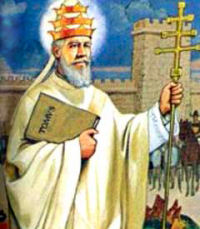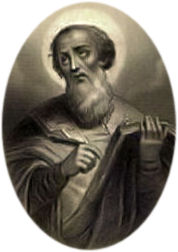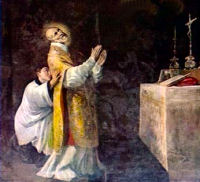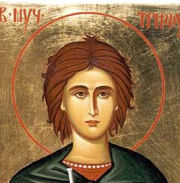
Daily Readings for: November 10, 2012
(Readings on USCCB website)
Collect: O God, who never allow the gates of hell to prevail against your Church, firmly founded on the apostolic rock, grant her, we pray, that through the intercession of Pope Saint Leo, she may stand firm in your truth and know the protection of lasting peace. Through our Lord Jesus Christ, your Son, who lives and reigns with you in the unity of the Holy Spirit, one God, for ever and ever.
- Death and Burial
- Namedays
- November and the Holy Souls
- Practical Suggestions for Christian Living (Anointing of the Sick)
- Praying for the Dead and Gaining Indulgences During November
- Prepare for Death
- Preparing for Heaven
- Religion in the Home for Elementary School: November
- Religion in the Home for Preschool: November
- Teaching About Death
- Teaching Children About Sickness and Death
- What is a Nameday?
- November Devotion: The Holy Souls in Purgatory
- Little Litany of the Holy Souls
- Prayer for the Church, the Civil Authorities, Etc.
- Prayer for a Happy Death
- Daily Acceptance of Death
RECIPES
ACTIVITIES
PRAYERS
LIBRARY
Ordinary Time: November 10th
Memorial of St. Leo the Great, pope and doctor
Old Calendar: St. Andrew Avellino, priest; Sts.Tryphon, Respicius and Nympha, virgins and martyrs
Today the Church celebrates the memorial of St. Leo the Great, pope and doctor, during whose pontificate the Council of Chalcedon (451) defined that Christ is one divine person with two natures, divine and human. It was a confirmation of his Epistola Dogmatica (Tomus) to the Patriarch Flavian of Constantinople. He vigorously defended the unity of the Church. He detained the onrush of the barbarians under Attila. His feastday in the Extraordinary Rite is April 11.
According to the 1962 Missal of Bl. John XXIII the Extraordinary Form of the Roman Rite, today is the feast of St. Andrew Avellino who was born in Sicily and died at Naples. As a cleric he went to Naples to study law, and was meanwhile raised to the priestly dignity. Today is also the commemoration of Sts. Tryphon, Respicius and Nympha. Tryphon, a Phrygian, was martyred with his companion Respicius at Nicaea (c.250). Nympha was a virgin of Palermo, martyred in the fourth century.
St. Leo the Great Leo I, Pope and Doctor of the Church, ruled from 440 to 461. He is surnamed "the Great" and ranks among the most illustrious sovereigns that ever sat on the throne of St. Peter. Of his life, we know little; with him the man seems to disappear before the Pope. He saw most clearly that one of his greatest tasks was to vindicate the primacy of the Roman bishop, St. Peter's successor, and to raise the prestige of the Holy See before the entire world. Hardly any Pope in history has occupied a like position in the ecclesiastical and political world.
Leo I, Pope and Doctor of the Church, ruled from 440 to 461. He is surnamed "the Great" and ranks among the most illustrious sovereigns that ever sat on the throne of St. Peter. Of his life, we know little; with him the man seems to disappear before the Pope. He saw most clearly that one of his greatest tasks was to vindicate the primacy of the Roman bishop, St. Peter's successor, and to raise the prestige of the Holy See before the entire world. Hardly any Pope in history has occupied a like position in the ecclesiastical and political world.
As a writer, too, his name is famous. His sermons, which occur frequently in the Divine Office, belong to the finest and most profound in patristic literature. The Council of Chalcedon was held under his direction (451). The Breviary tells us: Leo I, an Etruscan, ruled the Church at the time when Attila, King of the Huns, who was called the Scourge of God, invaded Italy. After a siege of three years, he took, sacked and burned Aquileia, and then hurried on toward Rome. Inflamed with anger, his troops were already preparing to cross the Po, at the point where it is joined by the Mincio.
Here Attila was stopped by Leo (452). With God-given eloquence, the Pope persuaded him to turn back, and when the Hun was asked by his servants why, contrary to custom, he had so meekly yielded to the entreaties of a Roman bishop, he answered that he had been alarmed by a figure dressed like a priest that stood at Leo's side; this individual was holding a drawn sword and acted as if he would kill him if he advanced farther. As a result Attila retreated to Pannonia.
Meanwhile, Leo returned to Rome, and was received with universal rejoicing. Some time later, the Vandal Genseric entered the city, and again Leo, by the power of his eloquence and the authority of his holy life, persuaded him to desist from atrocity and slaughter (455). Leo was also active in matters liturgical. The so-called Leonine sacramentary, a compendium of Missal prayers, contains
Excerpted from The Church's Year of Grace, Pius Parsch
Symbols: Image of the Virgin; pick-axe; model of St. Maria Maggiore; horse; Attila kneeling.
Things to Do:
- Learn more about the Nestorian heresy and the Council of Chalcedon;
- Just as St. Leo triumphed over the pagan invaders, pray for the civilized barbarians who would persuade us that religion should be eliminated from education and that the State, in its laws and institutions should simply ignore our Lord Jesus Christ;
- Read Pope John XXIII's Encyclical on St. Leo;
- The name Leo means "lion," so a cake in the shape of a lion would be an appropriate name-day dessert.
St. Andrew Avellino As a young priest Andrew served at an ecclesiastical court. While making a defense, a small lie slipped by his lips; soon afterward he accidentally read the words, "A lying mouth kills the soul" (Wis. 1:11). Deeply moved, he resigned his position and dedicated himself solely to the service of God and the welfare of souls. In 1566 he entered the Order of Theatines and chose the name Andrew out of love for the Cross of Christ. He labored most zealously as a shepherd of souls. With fatherly love and prudence he spent countless hours hearing confessions. He frequently visited the towns and villages in the neighborhood of Naples to preach the saving message of the Gospel.
As a young priest Andrew served at an ecclesiastical court. While making a defense, a small lie slipped by his lips; soon afterward he accidentally read the words, "A lying mouth kills the soul" (Wis. 1:11). Deeply moved, he resigned his position and dedicated himself solely to the service of God and the welfare of souls. In 1566 he entered the Order of Theatines and chose the name Andrew out of love for the Cross of Christ. He labored most zealously as a shepherd of souls. With fatherly love and prudence he spent countless hours hearing confessions. He frequently visited the towns and villages in the neighborhood of Naples to preach the saving message of the Gospel.
By means of miracles God Himself often glorified the love of neighbor burning in the heart of His holy priest. Once as he was returning home from a round of duties, the rain and wind extinguished the lantern he was carrying. He and his companion, however, were not soaked by the downpour. In fact, rays of light proceeded from his body and guided them through the dense darkness. Many came to him to settle cases of conscience, his letters number thousands. Worn out by work and enfeebled by age, he suffered a stroke at the foot of the altar just as he was beginning holy Mass and died as he repeated for the third time, "I will go unto the altar of God." He is venerated as patron against sudden death.
Excerpted from The Church's Year of Grace, Pius Parsch
Patron: Against sudden death; apoplexics; apoplexy; for a holy death; Naples, Sicily; stroke victims; strokes.
Things to Do: What is our attitude on speaking the truth? Think about the seriousness of lying and examine your conscience about your attitude toward the truth. The words, "A lying mouth kills the soul," might well resound in our ears all through the day. And in what condition is my love toward Christ and His Cross? Would I choose the name Andrew out of love for the Cross? What a beautiful death — to die at the altar! Pray for an equally happy death, well prepared, and with the mercy of the last sacraments.
Sts. Tryphon, Respicius and Nympha St. Tryphon, whose relics were preserved at Cattaro, in Dalmatia, had an oratory at Rome in which the Greeks celebrated his feast on February 1. For unknown reasons hagiographers have joined his commemoration with that of St. Respicius, who appears to have been a Roman martyr. St. Nympha was venerated at Porto in Sicily; her body, translated to Rome, was buried in the church of SS. Tryphon and Respicius. Due to lack of evidence this feast was removed from the General Roman Calendar in 1969.
St. Tryphon, whose relics were preserved at Cattaro, in Dalmatia, had an oratory at Rome in which the Greeks celebrated his feast on February 1. For unknown reasons hagiographers have joined his commemoration with that of St. Respicius, who appears to have been a Roman martyr. St. Nympha was venerated at Porto in Sicily; her body, translated to Rome, was buried in the church of SS. Tryphon and Respicius. Due to lack of evidence this feast was removed from the General Roman Calendar in 1969.
Patron: St. Trypon is the patron of gardeners.